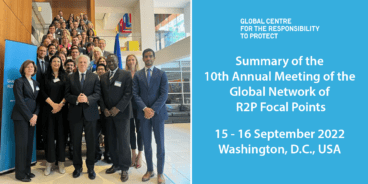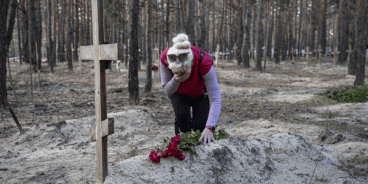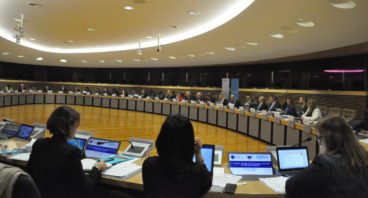
The Responsibility to Protect: Deepening our Commitment to Mass Atrocity Prevention, 5th Annual R2P Ministerial Meeting Summary
Coinciding with the opening of the 67th United Nations General Assembly, the governments of Botswana, Brazil, Denmark and the Netherlands, in association with the Global Centre for the Responsibility to Protect, co-hosted the fifth annual Ministerial Meeting on the Responsibility to Protect (R2P). The meeting opened with statements from the four governmental hosts: the Minister for Foreign Affairs and International Cooperation of the Republic of Botswana, H.E. Mr. Phandu T. C. Skelemani, the Minister for Foreign Affairs of Denmark, H.E. Mr. Villy Søvndal, the Minister for Foreign Affairs of the Kingdom of the Netherlands, H.E. Dr. U. Rosenthal, and the Vice-Minister for Political Affairs of the Ministry of External Relations of the Federative Republic of Brazil, H.E. Ms. Vera Lúcia Barrouin Crivano Machado.
The meeting was attended by the Prime Minister of Slovenia, H.E. Mr. Janez Janša, and 14 ministers representing governments from across the globe. The UN Deputy Secretary-General, H.E. Mr. Jan Eliasson, and the Special Adviser on the Prevention of Genocide, Mr. Adama Dieng, also participated. An additional ten governments from across Asia, Africa and Europe sent official observers to the meeting. As always, the meeting was conducted under the Chatham House Rule.
In keeping with UN Secretary-General Ban Ki-moon’s declaration of 2012 as the year of prevention, this year’s Ministerial Meeting discussed how to operationalize the preventive dimension of the Responsibility to Protect, and deepen our understanding of effective responses to the threat of mass atrocities.
Key Themes of the Discussion
Improving Preventive Capacities. A number of participants commented upon the need for the international community to build better capacity to predict and prevent mass atrocities. While one of the Ministers reminded participants that “no country is immune” from the social and political fissures that can lead to mass atrocities, emphasis was placed upon the need of all states to help develop the rule of law, build appropriate crisis response mechanisms and promote socioeconomic development. All states have a Responsibility to Protect and states must work together to advance international consensus around an agreed set of international standards and obligations with regard to protecting populations at risk. A range of R2P tools, “from preventive diplomacy to sanctions to robust human rights monitoring and accountability” were identified as being essential to building a comprehensive architecture for effective atrocity prevention. Alongside other key UN bodies, the increasingly important role of the Human Rights Council was specifically acknowledged by several participants with regard to enabling early warning and mobilizing a timely international response.
R2P Focal Points. A number of states referred to the need to collaborate internationally through a global network of national R2P Focal Points. This was viewed by some as a concrete example of the way in which all states, regardless of their historical conditions and varying levels of economic development, could make a practical contribution to building an international network of supportive governments who are committed to mass atrocity prevention. Several participants exchanged views on how to better coordinate future efforts to increase capacities to assess risks, actively prevent and halt mass atrocities, including through regional outreach and other diplomatic efforts. The Deputy Secretary-General argued that, “R2P is basically a tool of prevention” and encouraged all UN-member states to appoint a senior government representative to serve as a R2P Focal Point.
When Prevention Fails. A number of participants emphasized that when prevention fails and mass atrocities occur, the choice must not be between military intervention and doing nothing. Several speakers remarked upon the fact that the controversy over the UN Security Council’s intervention in Libya had “distorted” subsequent debate about how to respond to other mass atrocity situations. Military force should always be a last resort and other coercive tools and measures must be more effectively developed and deployed. In this context the Brazilian concept of “Responsibility while Protecting” was acknowledged as a positive contribution to the ongoing debate about the best ways and means to operationalize R2P in extreme crises. Nevertheless, several speakers remarked upon the fact that after prudent deliberation, the UN Security Council must always act in a timely and decisive way when it comes to halting mass atrocity crimes. In the words of one participant, “If we act early enough the choice does not have to be between doing nothing or using force – we already have a broad range of tools available and all three pillars of R2P support them.”
Ending impunity. Several speakers argued for the centrality of accountability. Ending impunity for past crimes can play a key role in preventing future mass atrocity crimes. In the words of one Minister, “The Hague is the final link in the international community’s chain of prevention – ending impunity is both a beginning and an end in the R2P process.” In this context, the situation in Syria was described by several participants as an issue of both prevention and response. “The news from Syria reminds us every day of our failure to prevent.” Accountability, ending impunity and international advances in strengthening the rule of law were seen by several participants as being mutually reinforcing processes.
Conclusion
The range of countries present at the meeting, and the high-level of the participants, was taken as an indication that the 5th R2P Ministerial Meeting was probably the most successful one ever. The co-hosts encouraged participants to remain engaged in promoting and broadening support for the Responsibility to Protect, especially given the urgent need to protect civilians at grave risk of mass atrocity crimes in Syria and elsewhere. Overall, despite variations in emphasis, participants endorsed the Secretary-General’s comment that, “We have not embraced R2P because it is easy, but because it is right.”
Related Content


Atrocity Alert No. 318: Ukraine, Syria and the Global Network of R2P Focal Points
